- Home
- Sherwood Smith
Twice a Prince Page 12
Twice a Prince Read online
Page 12
“Here she is,” Marka breathed, running toward a shadowy corner.
Tam Sharveshin emerged, sword in hand. “Ride out.”
A tall, skinny teenage boy with a prominent Adam’s apple and tousled cinnamon hair silently handed to Atanial a folded cape, the plain brown of a runner.
“Don’t tell us where,” Tam added.
She shook her head. “I won’t. But I’d like to know whom to thank for this rescue.”
Tam and the teen glanced up at the tower where Prince Jehan’s rooms were lit, even though he was gone.
“Ah.” Jehan Merindar.
The teen said in an unprepossessing nasal honk, “He told us to arrange it. Not to say when. So he officially won’t know when or how. His fellows in the guard helped. They’re all busy looking elsewhere.”
“I understand.” Atanial suspected the cost of being caught. They were so young to be in such danger, but she knew better than to mention it. From the looks of him, that teen would on Earth be a computer geek, the type who loved logistical challenges. “What will you say?”
“Nothing, if I get back to my patrol. They know you have some magical device.” Tam mimed holding a disc. “I overheard the orders for the search of your rooms when you were with the king, under Magister Zhavic’s direction. Rumor was, the magister thinks you carry a token around, but the king wouldn’t let him search you. So we figured if there were no signs left behind—and they won’t think to check the ivy—they’ll figure on magical transfer. And no one on wall duty right now will see anything at all.”
Atanial nodded, then the boy gave her a hasty lesson in horse care, indicating the feed bag, rolled blanket and curry comb in the saddle pack. “Most people will help with a horse if asked,” he finished.
Atanial thanked him as she shook out the cape and pulled up the hood. The soft, sturdy woolen garment smelled sun fresh. “All of you—I mean all including those outside this space. Thank you, my dears.” She kissed Marka and Tam, laughing silently when they blushed like children.
She hesitated before the teen, whose shoulders had come up to his jug-handle ears. She knew from his agonized face, his defensive posture, that however he felt about kisses from young ladies, he was definitely at that age when teenage boys would rather be tortured by fire and sword than kissed by old ones. So she patted him kindly on the arm, and laughed to herself at the way Marka and Tam’s hands came together, gripping tightly.
She mounted up and left at a sedate pace, riding along the military trail they’d pointed out only until she was out of sight of the city gates. Then she turned off the road.
Before long the low gray clouds began to drizzle, and she discovered that the runner cloak was warded against wet. The cool, sweet air smelled the better for the sense of freedom.
During the days and days she’d had time to think, she’d decided if she ever won free, she would begin her search at the abandoned morvende geliath Math had talked about, where mysterious mages had once taught him some mysterious magic: Ivory Mountain. Oh, not ivory from animals. They didn’t kill mammals for fur, meat, or anything else on this world. “Ivory” was far weirder, a stone that was more like metal, and in ancient histories—so Math had told her once, his eyes wide with wonder—it sang.
But before she found her way to Ivory Mountain, she needed allies. Alone, she couldn’t do anything. But one thing people in Los Angeles knew was the sheer weight of a crowd.
An inward image of a smart girl with capable hands, jug ears framed uncompromisingly by braids: What better person to go to first than Lark Silvag?
Chapter Fourteen
Because she was riding to the northwest, she and Jehan were on the opposite sides of the city, one departing, one arriving. Though they would have loved to have the leisure for a talk, they were unaware of the other’s movements.
Jehan’s mood was sober. Triumph after a successful escapade didn’t last long any more, not before the impending storm of trouble threatening the kingdom. At least this time he was spared the necessity that—it was becoming more obvious every day—only he insisted on, the swearing of a new partisan not to himself but to King Math. Elva Eban was already sworn to Math.
Even thinking about it brought Owl’s voice back a year or two ago. “What are you going to do if he’s dead?”
“I can’t think of that,” Jehan had responded. “I have to go on as if he’s alive.”
Owl, who had never known Math, shook his head with some sympathy. “You’d better think of it. Because you can be sure Randart is. Every single day.”
Owl’s voice echoed in Jehan’s ears as he rode through the south gate, waving in response to the salute from the sentries on the wall. He was going to be facing Randart soon, maybe now, more likely later. Jehan had hoped to get back before the war commander, who detested magic as much as he distrusted it. But that couldn’t be counted on.
The covert glances sent Jehan’s way when he reached the royal castle’s stable served as his weather vane. From the silence, the furtive glances, and the tension in hands and shoulders, it seemed his father was in far more of a temper than Jehan had expected. Maybe they hadn’t found the fake letter, or maybe they had and had figured out at last that those letters were indeed fake.
He handed over the reins of his mount and walked inside. He was met almost at once by a runner who said, with scared eyes, “The king would like you to come straightaway in, your highness.”
“All right. Thank you.” Tension gripped him.
His father was in his workroom. As soon as Jehan walked in, Canardan threw down his pen so hard it clattered to the floor. “Why,” he began in a tired voice, “did you see fit to ride out without a word to anyone, not even your own servants?” He flicked the letter. “Was her desire for your company really all that much more alluring than duty?”
“I thought so.” Jehan kept his voice even. “But then my duty is surpassing tedious. Not that I find Princess Atanial tedious, but trying to get her to go on rides, or even a walk in the garden, is not much of a duty when she refuses every single day, leaving me little to do.”
Regarding his son with a strange mixture of relief and anger, Canardan said abruptly, “Atanial vanished.”
Jehan had not expected that so soon. Mentally saluting Kazdi and the other guards, he exclaimed, “What?”
Canardan saw that unfeigned surprise and let out a slow breath.
Jehan comprehended then that his father had feared he’d been involved.
The king said in a far milder voice, “Atanial. Is gone. Missing. Probably used that thrice-damned magic token the mages said she had on her, but which I, being a fool, insisted they not take off her because she assuredly kept it next to her person. She would never have forgiven that.”
What that revealed: the king had had her rooms searched, and she knew it. She hadn’t trusted him, and he knew it.
Jehan sat down as Canardan walked round the desk, stooped, picked up the pen. “I don’t know where she went. Maybe back to her world, as Zhavic insisted the token was a World Gate one. Maybe she had a transfer spell for this world over it, and went straight to the tower, and then out. Perran, who is there, might not have even seen her. At least he hasn’t been here to report anything untoward at the tower. I hope that’s the case.”
Jehan rubbed his jaw. “Is it a problem to have her here?”
“No. Yes. Everything is a problem,” Canardan said angrily.
Jehan’s neck tightened. Was his father, at last, going to admit to the secret plans for the spring invasion?
For weeks Jehan had wrestled inwardly about that question—whether it would be better or worse to be told. Either way was going to mean endless trouble, but he had finally decided that if his father kept it secret, it was because the king truly knew that breaking the treaty with Locan Jora was wrong. Whatever excuses would subsequently be offered.
If the king had talked himself into speaking openly about it before Jehan, that brought its own troubles. An invasion of what wa
s legally if not historically another country was royal treachery on a scale that could only be dealt with by a king. Like Math. Otherwise the kingdom would be plunged into the sort of bloody civil war that had happened far too often over Khanerenth’s long history.
And none of Jehan’s own intensely loyal, dedicated, brave, smart, risk-taking and innovative followers knew about the invasion, except for Owl. He couldn’t tell them until he knew for certain it was true.
“…so you see, though I know what it’s like to be young—and I loved assignations as much as the next young man, when I was your age—I need you to stay here. You can grace various occasions, especially those given by foreigners with their constant spies, when my time demands I be elsewhere. We have too many problems. I cannot risk angering the least of the ambassadors or envoys by avoiding their social foolishness, and with winter coming, there will be even more of it.”
Jehan signified assent. A runner entered and bowed. “War Commander Randart rode into the stable, your majesty. Requests an immediate interview.”
Canardan lifted a hand and she dashed out.
“Let’s not say anything about this, shall we?” Canardan murmured, picking up the fake letter and tossing it onto the fire. “I’m certain that Randart has enough on his mind, and we understand one another, do we not?”
Jehan bowed. “I’m certain he will wish to keep his interview private.”
Canardan was on the verge of acknowledging the truth of this, then he paused, regarding his son with a puzzled frown. Duty. The boy did seem to be slightly less wool-minded than usual. Was it possible he was waking up to his responsibilities?
“Stay,” he said, coming to a sudden decision. “Zhavic sent me a report. There was trouble with the fleet, and the pirate apparently got away. Whatever Randart has to say, you may as well hear it.”
The war commander was there moments later, a tall, husky man whose strong arms strained against the sleeves of his sturdy brown cotton-wool tunic. He scorned velvet. The tunic was also unmarked as any warrior’s, except for the silver crown stitched over the golden cup—the device of the king’s own man. He didn’t need to wear rank markers, because in his own view, his rank was the highest in the kingdom, above mere dukes. Except of course for the king himself.
Randart’s face hardened even more than usual when he saw who was sitting with the king. He hesitated, and Jehan knew that the war commander was waiting for the king to dismiss his son like an errant lap dog.
“Your report?” Canardan asked, with the smiling irony that signaled to Jehan his father was quite aware of Randart’s attitude.
Randart clawed his shaggy, gray-streaked hair back, a rare, entirely human gesture. Both father and son recognized how upset Randart had been by his defeat. “The pirate tangled the merchants with my naval ships, under cover of smoke screen. I’d captured one of the Eban brats, and was in the middle of questioning her when the attack commenced. The pirates boarded my flagship, a merchant, and got her away while my own guard and the sailors ran around getting in the way of one another’s blades. The smoke did not help. In short, a disaster.”
He dropped a sheaf of papers onto the king’s desk. “Here are the details, if you want them, on the top report. The rest are my brother’s reports on guard and academy matters.”
Canardan did not even glance at the papers. “Why did you make a flagship of a merchant? Did they know naval maneuvers?”
“No. I intended to train them into a fighting fleet.”
“In a matter of weeks? I thought our navy trained for longer. Well, never mind, I can appreciate your thinking, but it might be better in the future to set up your flag on the fastest ship.”
Randart saluted, lips tight.
“I take it Zathdar himself was present?”
“Description of the leader of the rescue party fits, but I did not see him myself.”
Canardan frowned. “Yet you say this happened aboard your flagship. Where were you?”
“Buried underneath an enormous sail which apparently fell due to fires in the upper masts. The pirates kept up a steady barrage of fire arrows. By the time I cut my way out, the pirates were gone, with my prisoner.”
Canardan sighed. “And so we have it to do again.”
Randart hesitated, looked at the vacant blue eyes of the idiot son, and shut his teeth. His subsequent discoveries and surmises would wait until he could be alone with the king. It made him angry enough to have to admit to defeat before the Fool. But he deemed it just retribution.
Except, what did the sheep know? Prompted by the sudden, unpleasant conviction that the king had told the sheep about the invasion, he tested, saying, “So as for the future—”
The king waved a hand. “All that can wait. I can see from the mud you’ve been riding all day. Go get something to eat. Get some rest. I can read through the reports while you do those things.”
Randart stood up. “I’ll give the orders for the execution. We can do that at noon tomorrow, before I—”
“Execution?” Canardan repeated.
“Of course. The traitor guardsmen. Silvag, and I forget the other’s name. If we put crossbolts through them, that should solve your civilian-trial problem—”
Canardan was just irritated enough with Randart to resent this summary disposition of his time. “Not tomorrow. I have three interviews, two of those with envoys. Nothing is more awkward than executions, especially when you’re trying to smooth things over. It can wait.”
Randart had been considering whether or not to tell Canardan about the report and his theory on Atanial’s missing daughter. Telling the king would have eased some of the bitterness of his defeat. On the other hand, nailing that girl down first would go even further in removing the bitterness of defeat.
Then there was the matter of Canardan’s wavering.
Maybe it would be better to secure her first, and…
And see.
Smiling with grim anticipation, Randart withdrew.
Chapter Fifteen
Bored and hot, the two guards on patrol rode at an idle pace along the established perimeter. You didn’t question orders, you just obeyed, but there wasn’t much chance of action guarding a bunch of old people, half of whom were in jail.
Atanial watched them from the shade of an ancient, gnarled willow. Through its hanging green curtain, still in the late-summer air, she peered after the patrol, timing them as she waited for the cover of darkness.
She was tired and hungry and thirsty, despite having had a long drink at the last stream. She knew she’d be a lot worse off if she had to let the horse go. That might happen. It’s difficult to hide a horse.
So far, she was all right. The animal stood patiently in the shade with her, tail twitching. When at last the shadows fused into darkness, she decided to move after the next patrol. It came right on time, roughly an hour after the last round. She waited until the pair had safely ridden by, then tied the reins of her horse loosely to a low branch, pulled out the feedbag, filled it and put it on the horse.
This took longer than she’d thought it would, as she and the horse were unfamiliar with one another. The movements were also unfamiliar.
When she was done, she took off running with her head low. She zipped across the road and over a gentle hill toward the Silvags’ orchard. She was just thinking of cover, but she almost ran Lark down, who was out picking peaches now that the sun was gone.
They both gasped, Lark almost dropping her basket. The girl poised to flee.
Atanial whispered, “It’s me, Sun—er, Atanial.”
Lark whistled. “You better leave, your highness, before my mother—”
“Before your mother what?” Plir Silvag rounded an old peach tree, a basket on her arm. She was only a silhouette in the deepening gloom, but Atanial saw the tension in her movements. “Who are you? You can’t be—”
“Sun. Atanial. Whatever—”
“Get. Out.”
Atanial sighed, the inner vision of water, food
, a bath vanishing. “Please. Just listen to me.”
“Last time I listened to you, my husband got taken. He may even be dead for all I know—”
“He’s not.”
“So you say—”
“He’s not. Tam would have told me. They’re all safe. The king won’t do anything to them because he agreed to hold a trial.”
“She’s right,” Lark said. “Tam said so. So did my cousin in the stable.”
“You hold your tongue.”
“Ma, Tam keeps telling us—”
“He’ll say anything,” Plir retorted. “To protect that little traitor Marka.”
Atanial winced. How sickening civil war was, the conflict and division from regions right down to the personal level.
Plir’s basket whisked against her skirt, a scratchy sound, as she shifted it. “All right. I’ll listen. But if that patrol catches you, I’ll just stand by and watch. I’m not losing my home too.”
“I’ll be quick, I promise. I spied on the patrol all day, and I know when they’ll come round again. I promise to be long gone before they do.”
“Speak, then.”
“First, I’m sorry about your husband, and I know they got Folgothan too.”
“He couldn’t run,” Plir Silvag said bitterly. “Because someone stabbed him in the leg. And my husband wouldn’t just leave him.”
“Is Haxin all right?” Atanial remembered the name of the ferret-faced fellow.
“He is,” Lark spoke up. “But Kenda—his daughter, my age, well, Kenda was dismissed from the service. She just got promoted to signal flag officer on Adamant. But the war commander turfed her out. On account of her dad.”
“They went over the mountain back to Locan Jora, where his cousins live,” Plir said.
“Oh no.” Atanial hadn’t meant it to slip out, but both the Silvags exclaimed, “What?” Their voices were hoarse with the effort to keep from yelling.
“That’s why I came. Word is, the king plans an invasion of Locan Jora in the spring. No, no, please don’t talk. I promised you I’d speak my piece and be gone, so let me speak it. I know you don’t want any fighting, not with friends and cousins and so forth over there. I don’t either. You saw what happened when I took up the sword. One fight, and Folgothan got hurt and arrested. Even small wounds can have bad consequences.”

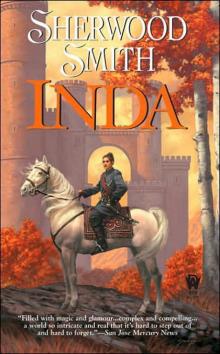 Inda
Inda Danse De La Folie
Danse De La Folie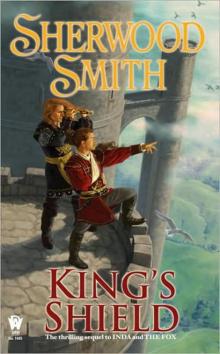 King's Shield
King's Shield Whispered Magics
Whispered Magics Fleeing Peace
Fleeing Peace Barefoot Pirate
Barefoot Pirate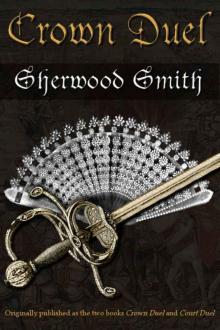 Crown Duel
Crown Duel Mearsies Heili Bounces Back
Mearsies Heili Bounces Back Commando Bats
Commando Bats A Stranger to Command
A Stranger to Command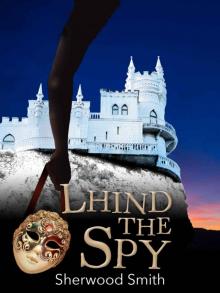 Lhind the Spy
Lhind the Spy The Spy Princess
The Spy Princess Blood Spirits
Blood Spirits Sasharia en Garde
Sasharia en Garde Lhind the Thief
Lhind the Thief Paradise Drift
Paradise Drift Banner of the Damned
Banner of the Damned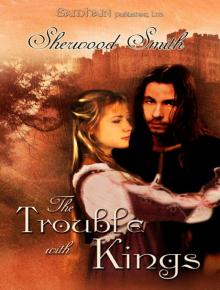 The Trouble With Kings
The Trouble With Kings Poor World
Poor World Treason's Shore
Treason's Shore Wren Journeymage
Wren Journeymage A Posse of Princesses
A Posse of Princesses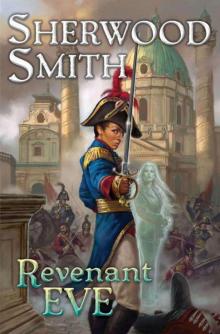 Revenant Eve
Revenant Eve Once a Princess
Once a Princess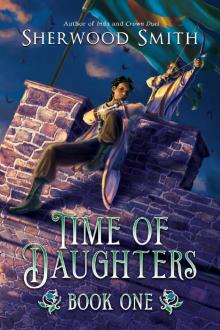 Time of Daughters I
Time of Daughters I Rondo Allegro
Rondo Allegro Coronets and Steel
Coronets and Steel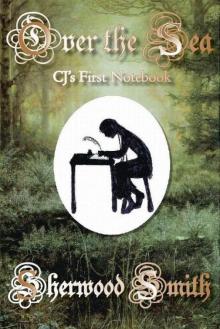 Over the Sea
Over the Sea Senrid
Senrid Hunt Across Worlds
Hunt Across Worlds A Sword Named Truth
A Sword Named Truth The Fox
The Fox Twice a Prince
Twice a Prince Fair Winds and Homeward Sail: Sophy Croft's Story
Fair Winds and Homeward Sail: Sophy Croft's Story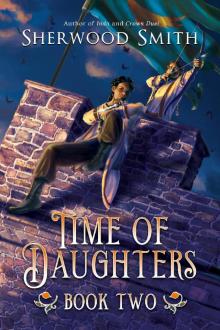 Time of Daughters II
Time of Daughters II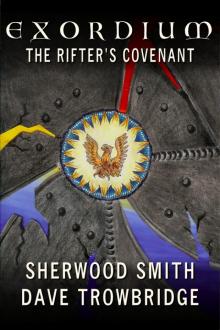 The Rifter's Covenant
The Rifter's Covenant The Phoenix in Flight
The Phoenix in Flight Stranger
Stranger The Thrones of Kronos
The Thrones of Kronos A Prison Unsought
A Prison Unsought Twice a Prince: Sasharia En Garde Book 2
Twice a Prince: Sasharia En Garde Book 2